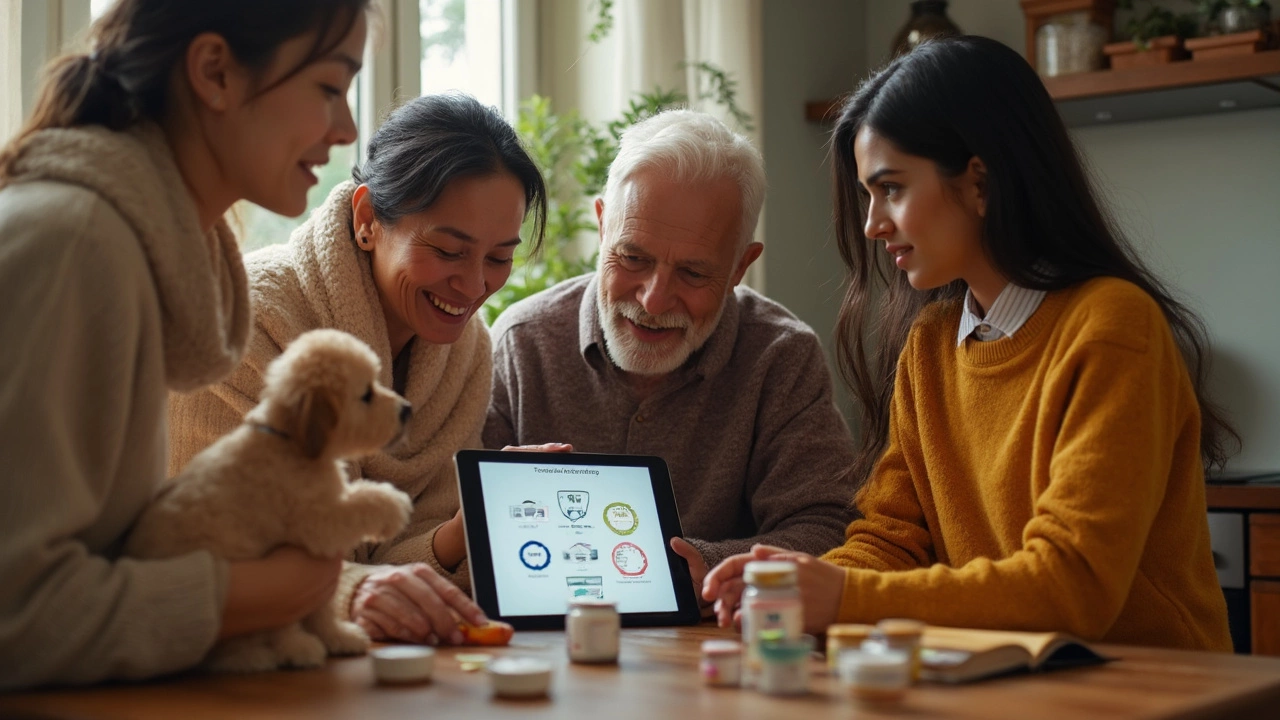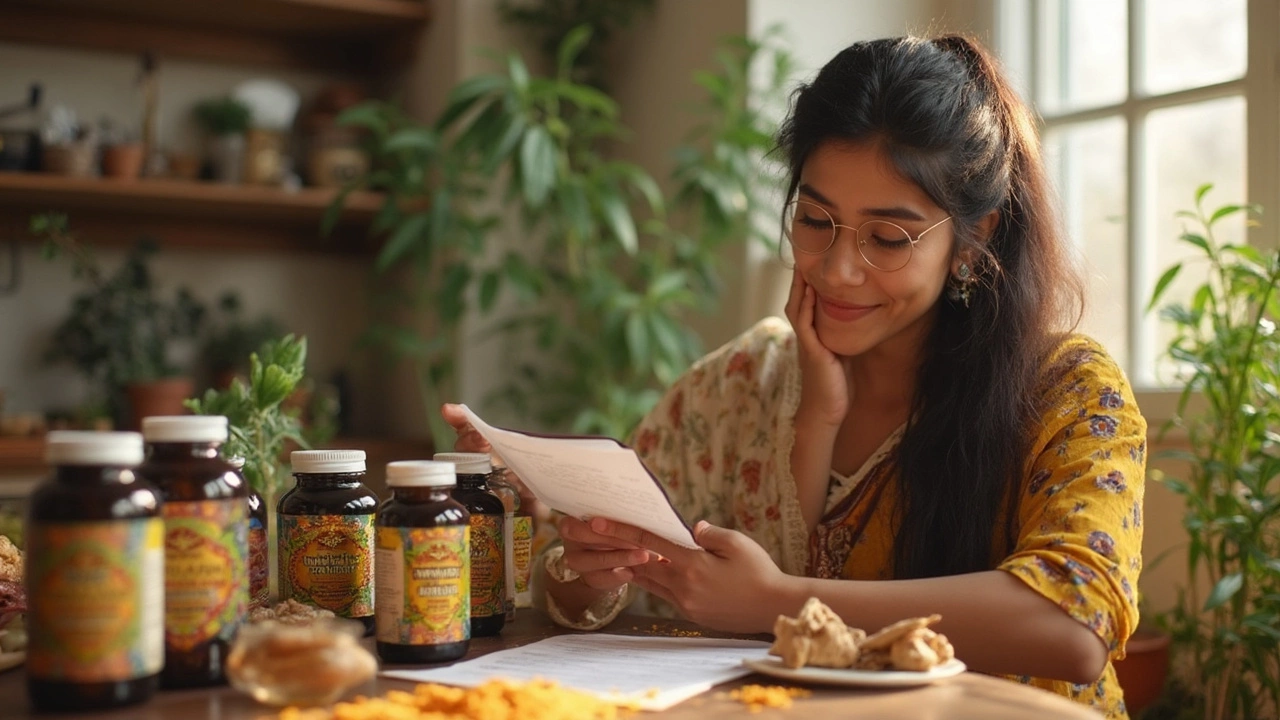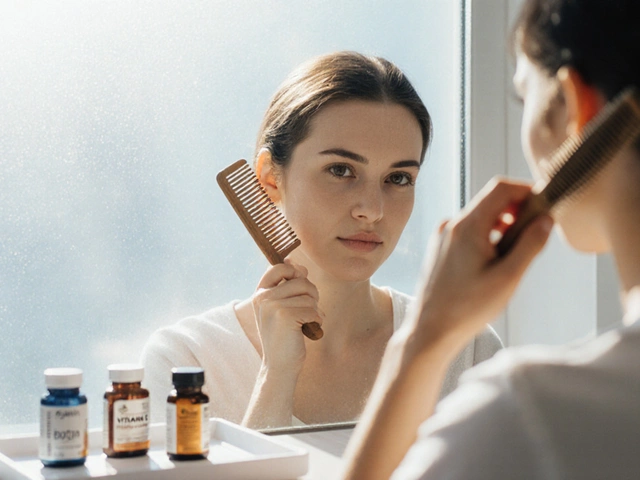There's a weird feeling that hits me every time I'm standing in the supplement aisle, squinting at a wall of green bottles. Each label claims to be the best, but a lot of it sounds like marketing mumbo jumbo. These days, picking the right herbal supplement isn’t just about reading what's on the label—it's about knowing who made it.
Not all herbal supplement companies play by the same rules. The real game is spotting the ones that back up their promises with real science, strong safety practices, and clear sourcing. Ever heard of companies using cheap fillers or sketchy ingredients? It happens more than you’d think. And when you're picking supplements for family (or honestly, even for the dog), you don’t want to take wild guesses with their health.
The best companies are upfront about where their herbs come from, how they test for things like heavy metals and pesticides, and what’s actually in each pill. Some brands will even show third-party test results right on their website. That’s not just a nice bonus—it’s what you should expect from anyone making something you swallow every day.
- Why the Brand Matters
- What Makes a Company Trustworthy?
- Heavy Hitters: The Top Herbal Supplement Companies
- How to Spot Red Flags and Green Flags
- Personal Picks and Lessons Learned
- How to Buy Smart: Tips for Everyday People
Why the Brand Matters
Ever gotten excited about a new herbal supplement, only to read a news story about contaminated products or fake ingredients? Turns out, the company behind the bottle matters a lot more than most people think. When it comes to herbal supplements, the quality difference from one brand to another can be huge—and not just in price.
The U.S. doesn’t have super strict rules for supplements like it does for prescription drugs. This means some companies cut corners. If a brand doesn’t care about clean sourcing or testing, you could end up with fillers, heavy metals, or stuff that isn’t even the right herb. ConsumerLab did some undercover testing and found about 15% of herbal supplements fail to meet their own label claims. Even scarier, a 2023 report showed several supplements sold online were spiked with hidden drugs or didn’t have the herb they claimed at all.
Here’s why a good brand really counts:
- Transparency: They’re open about where their herbs come from and how they check for purity.
- Testing: Trusted companies use outside labs (third parties) to test for contaminants and make sure what’s on the label is in the bottle.
- Consistency: The formula stays the same from batch to batch, so you get the same results every time.
- Recall history: Reliable brands have fewer recalls or safety warnings compared to sketchy brands.
Check out this table for a quick look at the real risks of choosing just any brand:
| Brand Type | Chance of Contamination | Third-Party Testing | Average Price |
|---|---|---|---|
| Cheap, Unknown | High (over 20%) | Rare | Low ($) |
| Mid-Range, Some Reputation | Medium (5–10%) | Occasional | Medium ($$) |
| Well-Known, Trusted | Low (<2%) | Standard | High ($$$) |
If you want a supplement with real results and no ugly surprises, pick companies with a record of safety, honesty, and real product testing. That’s why brand matters way more than clever packaging or celebrity ads.
What Makes a Company Trustworthy?
Anyone can slap a leafy label on a bottle and call it natural, but that's not nearly enough. The real trick is finding a herbal supplement company that’s serious about safety, quality, and honesty. Let’s cut through the noise.
First up—third-party testing. Reliable brands like Gaia Herbs, NOW Foods, and Nature’s Way send their products to labs that aren’t tied to their company. This means you get results that actually matter: are the herbs what they claim to be, and are there things in there that shouldn’t be?
Transparency is huge. Trustworthy companies show where their herbs come from—often right down to the supplier, or even the country and region. For example, Gaia Herbs has a "Meet Your Herbs" program where you can look up the origin and test results for your exact bottle. That level of detail is a sign they have nothing to hide.
Certifications don’t guarantee everything, but they should be on your checklist. Trusted brands have certifications like:
- USP (U.S. Pharmacopeia) or NSF – for ingredient quality and safety
- USDA Organic or Non-GMO Project – shows they avoid sketchy chemicals
- Good Manufacturing Practice (GMP) – this means their production space gets regular safety checks
Watch out for companies that use vague statements. Stuff like “proprietary blend” can hide low-quality fillers or weak doses. Honest companies spell out amounts and ingredient sources—no guesswork.
Finally, look at their track record. Real customer reviews will show if the supplement consistently works or if people are seeing weird side effects. Companies with responsive customer service (not just a chatbot) score big points in my book.
For anyone buying herbal supplements, picking a trustworthy company isn’t about flashy branding—it’s about real info you can check up on. If a brand meets these standards, you’re in way safer hands.
Heavy Hitters: The Top Herbal Supplement Companies
If you’re wondering which companies actually deserve the spotlight in the herbal supplements game, here are the names that keep showing up for all the right reasons.
- Gaia Herbs: Known for full transparency, Gaia even lets you see a product’s origin and test results by scanning the code on every bottle. Their herbs are mostly organic, and they do a lot of their own farming in North Carolina.
- Nature’s Way: Loved for value and reliability, Nature’s Way is one of the oldest companies out there. They use third-party testing and carry the TRU-ID certification, so what you see on the label is actually what you’re getting.
- NOW Foods: Affordable and surprisingly rigorous with their quality checks. Their in-house labs are kind of legendary in the supplement world. They test for heavy metals, pesticides, and even allergens, making them a safe bet for picky buyers.
- Herb Pharm: If you prefer liquid extracts or tinctures, this is the go-to. The company’s been at it for over 40 years, uses organic herbs, and runs its own farm in Oregon. They’re also super clear about extraction methods, which matters for potency and safety.
- Solaray: Tons of variety here. Solaray's good for single-herb supplements and unique blends. They do solid testing and their quality has a loyal following, especially among folks who want a big selection.
These aren’t just popular—it’s about how consistent their safety, testing, and transparency are year after year.
| Company | Founded | Certifications | Farming | Third-party Testing |
|---|---|---|---|---|
| Gaia Herbs | 1987 | Organic, Non-GMO | Owns Farms | Yes |
| Nature's Way | 1969 | TRU-ID, NSF | Partners with Farmers | Yes |
| NOW Foods | 1968 | Non-GMO, GMP | Global Sourcing | Yes |
| Herb Pharm | 1979 | Organic, Non-GMO | Owns Farms | Yes |
| Solaray | 1973 | GMP | Global Sourcing | Yes |
If you stick with any of these, you’re sidestepping a lot of the shady stuff. The point is, when you're picking the best herbal supplement company, it's worth checking who takes transparency and quality seriously, and these names check most boxes.

How to Spot Red Flags and Green Flags
If you want to avoid getting scammed or taking something sketchy, you’ve got to know the warning signs. Walking into a supplement shop or scrolling online, it’s easy to get overwhelmed. But looking for just a few things can help you tell junk from quality pretty quickly.
Here are a few obvious red flags to look out for:
- No mention of third-party testing — trustworthy brands almost always have this.
- Labels that don’t clearly show what’s inside (missing ingredient amount, source, or weird “proprietary blend” with no specifics).
- Health claims that sound too good to be true — like "cure-all" or "100% guaranteed to work." Anything that promises miracles probably isn’t legit.
- Products without a contact number, support email, or real address.
- Super cheap prices way below the competition (usually means poor sourcing or cut corners).
Green flags are easier to spot once you get the hang of it. Reliable brands usually check all these boxes:
- Clearly listed active ingredients with standardized amounts.
- Evidence of third-party testing on the label or company website (look for names like NSF, USP, or ConsumerLab).
- Transparent about where and how the herbs are grown—fair trade and organic practices are a bonus.
- Proper certifications: “cGMP” (current Good Manufacturing Practice) means they follow strict safety rules.
- A real track record and lots of honest reviews, not just five-star ratings that all sound fake.
The FDA doesn’t require pre-approval for supplements, so companies can slip by with bad stuff. The herbal supplements industry is full of wild claims, but you don’t have to get burned. Here’s a quote straight from the National Institutes of Health:
“Consumers should look for products that have been certified by an independent testing organization, such as NSF International or USP… [and] be skeptical of claims that sound too good to be true.”
This table makes it clear which warning signs (and green flags) you should remember next time you’re buying:
| Red Flag | Green Flag |
|---|---|
| No 3rd-party testing listed | Shows NSF, USP, or ConsumerLab badge |
| Missing or vague ingredient list | Clear labeling, standardized extracts |
| Too-good-to-be-true claims | Science-backed claims (with references) |
| No contact info or shady website | Accessible support and real address |
| Super cheap prices | Reasonable pricing, refunds offered |
Give yourself the benefit of doubt. If something feels off, it probably is. The best brands make it easy to trust them by being up-front, clear, and easy to reach.
Personal Picks and Lessons Learned
If you ask my family, they’ll say I've gotten a bit obsessed with researching herbal supplements—maybe too obsessed, if you include Aarav's jokes about my "bottle collection." But it pays off, because I’ve tested the big names, read reviews, and swapped tips with friends (and my vet, for Max and Luna). Here’s what actually worked for us—and what flopped.
First up, I keep coming back to Gaia Herbs when choosing a herbal supplements brand for my family. Gaia grows most of their own herbs on a certified organic farm in North Carolina, and they’re upfront about their testing. You can even trace each product’s ingredients by checking a code on their website. That’s real transparency. They publish third-party lab results, too. Another heavy hitter is Nature’s Way—old, reliable, and one of the first companies to get their products NSF certified for purity back in the early 2000s.
To keep things practical, here’s a quick table showing what stood out when I compared brands:
| Brand | Transparency | Organic/Honest Sourcing | Third-party Testing | Average Price (USD) |
|---|---|---|---|---|
| Gaia Herbs | Excellent | High | Yes | 28 |
| Nature’s Way | Good | Good | Yes | 16 |
| NOW Foods | Good | Fair | Yes | 12 |
| Herb Pharm | Great | Excellent | Yes | 20 |
I’ve tried saving a few bucks with unknown brands from online marketplaces, but it came with weird side effects (upset stomach, mainly) and no clear accountability when I asked about ingredients. Once you see how much effort the best companies put into quality and proof, it’s harder to trust anything less.
Here’s the real lesson: cheap doesn’t mean safe, and sometimes paying just a little more protects you from contaminated or fake products. According to Consumer Reports, "Tests have found dangerous heavy metals, pesticides, and even prescription drugs in some herbal products bought online."
"Not all herbal supplements are created equal—trustworthy brands invest in quality control because it truly matters for safety and effectiveness." – Dr. Tod Cooperman, President, ConsumerLab.com
So these days, I check for a company’s certification badges, lot numbers, and batch-testing details on every bottle. And if it’s something I’ll give to Aarav or slip into Max’s favorite treat, I make sure it’s either certified organic or has a full traceability report online.
- Stick to brands with a strong reputation and clear, testable info.
- Look for full disclosure of ingredients—if you can't find it, don't buy it.
- Never assume "natural" always means safe.
It’s not just about being picky—it’s about making sure what you buy isn’t risking your health or your family's. Trust me, once you start checking, you won’t want to go back.
How to Buy Smart: Tips for Everyday People
Walking into a health store or cruising the internet for herbal supplements can feel like a minefield. Every product shouts for attention, but trust me—if you know what to check, you cut through the noise fast. I learned the hard way, after a cheap bottle of ashwagandha gave me a major headache and made our cat Luna try to eat the capsules (not joking). Now, I follow a solid routine so my family and even Max (our dog) get real stuff that works. You can do the same. Here’s what really matters when choosing the herbal supplements you take home:
- Double-check the ingredients list. Brands that hide behind vague terms like “proprietary blend” aren’t telling you something. Look for exact herb names and what part is used (root, leaf, etc.).
- Look for third-party testing. If a label mentions testing by groups like NSF, USP, or ConsumerLab, that's gold. These guys catch companies trying to sneak in fillers, heavy metals, or fake ingredients.
- Scan for certifications. USDA Organic, Non-GMO, and cGMP mean the product met real standards, not just marketing talk.
- Stick with established brands. Some names—like Gaia Herbs, Nature’s Way, and Himalaya—are everywhere for a reason: they’ve been around, they get checked often, and they own their mistakes (they also get called out if they've ever slipped up, so they're careful).
- Watch for recall info. Don’t laugh—it happens! Type the brand name and “recall” into Google before you buy. You’d be surprised how often this saves you.
- Do a price check—if it’s too cheap, be careful. Pure, genuine herbs cost something. Rock-bottom prices usually mean cut corners somewhere along the line.
If you’re more of a numbers person, check this table. I put together simple stats on recall rates from the FDA and the types of testing certifications reliable companies use. This stuff will save you time and maybe some stomach trouble later:
| Brand Name | Third-party Testing | FDA Recalls (2018-2024) | Main Certification(s) |
|---|---|---|---|
| Gaia Herbs | Yes (USP, NSF) | 0 | USDA Organic, Non-GMO |
| Nature's Way | Yes (USP) | 1 (2020, labeling issue) | cGMP, Non-GMO |
| Himalaya | Yes (ConsumerLab) | 0 | USDA Organic, cGMP |
| Unknown Online Brands | No | 6+ | None or Unverified |
Here’s my last tip: before trusting “miracle” reviews online, Google the company and see if they actually respond to questions or complaints, either through customer support or on their social feeds. Real, responsive brands stand out fast. It’s about your health, not their marketing. Buy like it matters—because it does.

 Bhringraj: The King of Herbs for Hair Growth and Strength
Bhringraj: The King of Herbs for Hair Growth and Strength
 Psychologist vs Therapist: Which Mental Health Expert Is Right For You?
Psychologist vs Therapist: Which Mental Health Expert Is Right For You?
 Open Heart Surgery Recovery: What You’ll Need at Home
Open Heart Surgery Recovery: What You’ll Need at Home
 Top Vitamins That Grow Hair Fastest: Science‑Backed Guide
Top Vitamins That Grow Hair Fastest: Science‑Backed Guide
 Understanding the Risks: Metformin's Impact on Diabetes Management
Understanding the Risks: Metformin's Impact on Diabetes Management